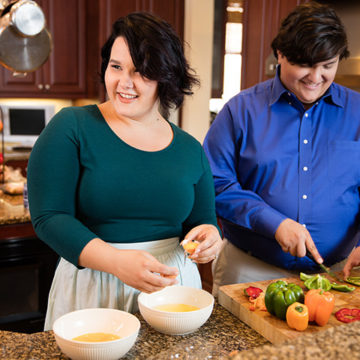 Managing weight can be a challenging process for relationships. Arguments can happen, miscommunication is common and people get frustrated. This is when each person needs even more compassion for their partner — not less. Weight management is a process, and for many people it can be viewed as a big sacrifice. But people gain so much more in life as they travel the journey toward improved weight and health.
Managing weight can be a challenging process for relationships. Arguments can happen, miscommunication is common and people get frustrated. This is when each person needs even more compassion for their partner — not less. Weight management is a process, and for many people it can be viewed as a big sacrifice. But people gain so much more in life as they travel the journey toward improved weight and health.
6 Tips for Relationships
1) See Things from Your Partner’s Perspective
This journey can be short and sweet or long and tedious. Although there’s so much more to gain in terms of a higher quality of life, some people get lose in “why” they are on this journey because they are frustrated with the process. Try to see things from the perspective of the person who is managing their weight.
- What energy are they putting into this?
- How might they be feeling during this time?
Looking at it from a different perspective can help you see that it might not be all sunshine and rainbows. The other person is working very hard.
2) Be Kind and Communicate
As you change your lifestyle, your mood can quickly shift. This can sometimes leave you with little patience or lead to frustration. This is also why you should be patient, kind and understanding of the process. For one person, it may seem pretty easy. But for another person, it might seem like climbing a mountain with ten-ton bricks on one’s back.
In relationships, we rely on clear communication to understand one another and flourish as partners. When someone’s mood is off, they can be snappy, short and curt. Some refer to this mood as “hangry,” or a combination of hungry and angry. The food/mood connection becomes very clear here. With weight management, some people can feel deprived and become overly moody. Revisit Tip #1 to see things from your partner’s perspective.
3) Be THERE. Ask How You Can be of Support
Ask. Ask. Ask. Then ask some more about how you can help. This is a journey. Your partner will likely welcome the emotional support, a workout buddy or help in the kitchen cooking healthier meals. Not all couples will work out together and that’s okay — but if you do things together, it can help their success rate. If you are someone who wants to help your partner succeed, be there for them but be careful not to push them. Nobody likes the “food police” or someone hounding them about going to the gym. Support is good. Just be sure you’re not overdoing it.
If your partner doesn’t want the hands-on support of assisting with dinner or working out together, be understanding of that too. Instead, ask how you can support them indirectly. You might just need to be a listening ear on the more difficult days.
4) Give Encouragement
For each and every person, it is important to be encouraged and recognized for hard work that is put in. This helps people feel validated and not alone. It also builds intimacy as it helps the other person realize that his/her partner is paying attention and is participating in the process.
5) Be Considerate of Your Partner’s Process
A client once told me that her husband wanted to help her celebrate her 50 lb weight-loss by taking her out to dinner. While she recognized his kind gesture, she realized he hadn’t understood that by celebrating with food, it could potentially sabotage her goals. They discussed this issue and he confessed that he had not even thought about it that way.
This is why being considerate and thoughtful of the other person’s journey is important. It’s also important to look at your own intentions when going out to eat. Is your partner avoiding chocolate cake? Is that a trigger food? Then why take him/her to a cake shop? Things like this help avoid disaster and support the relationship through thoughtfulness.
6) Celebrate the Successes
All success should be celebrated, so why not do something together or share kind words of celebration to show your partner you care? As noted above, going out to eat may not the best choice of a celebration. However, you can do many other things that don’t include food such as giving words of encouragement, flowers, love notes or a shared activity.
About the Author:
 Kristin Lloyd, MS, LPC/LMHC, PhD-c has been creating outstanding results for individuals, couples and organizations for over 10 years as a highly-accomplished psychotherapist, transformational mindset mentor, college educator and consultant. She is now leading bariatric patients and candidates through massive mindset shifts to help them create lasting behavioral changes and emotional adjustments for happy and healthy lives. You can find out more about Kristin at www.bariatricmindset.com.
Kristin Lloyd, MS, LPC/LMHC, PhD-c has been creating outstanding results for individuals, couples and organizations for over 10 years as a highly-accomplished psychotherapist, transformational mindset mentor, college educator and consultant. She is now leading bariatric patients and candidates through massive mindset shifts to help them create lasting behavioral changes and emotional adjustments for happy and healthy lives. You can find out more about Kristin at www.bariatricmindset.com.

